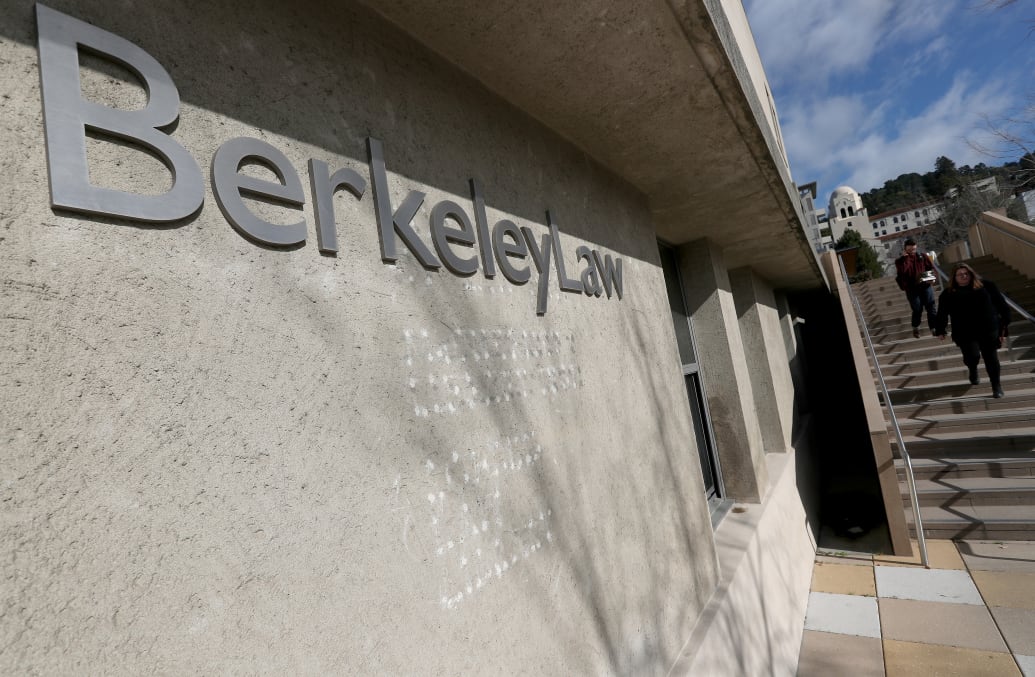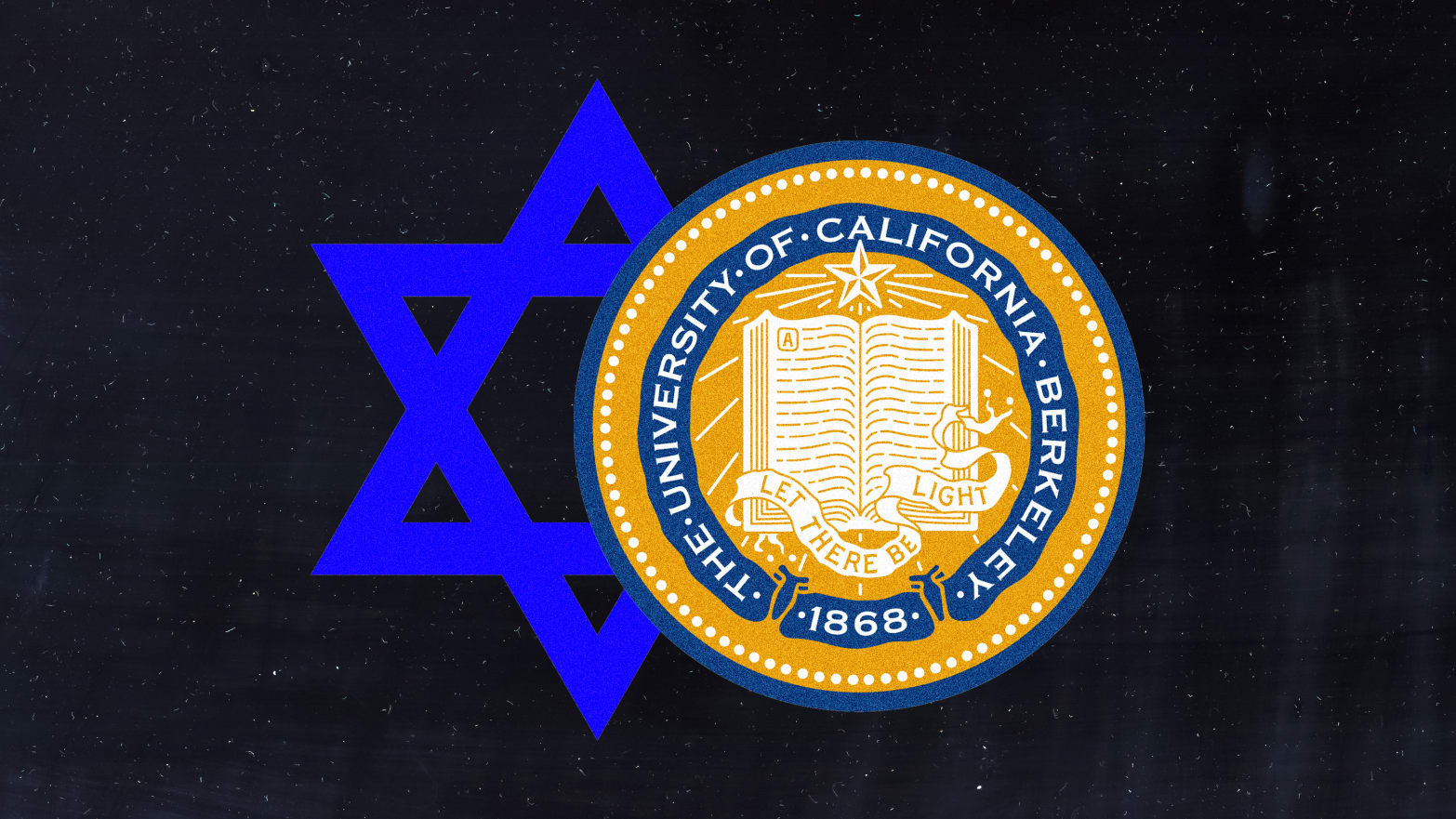We are second-year law students at the University of California, Berkeley. We are Jewish. And we are Zionists. (We are also speaking for ourselves, and not on behalf of the school or any organization.)
Friends, family, and the media repeatedly contacted us over the past several weeks to ask how it feels to be students at a school with “Jewish-free” zones. While there are no explicit “Jewish-free” zones at Berkeley Law, there is an unacceptable tolerance for excluding and demonizing Zionist identities. We want to share the impact this has on us as Jewish students.
Student leaders of organizations which adopted a Boycott, Divestment, and Sanctions (BDS) by-law this fall were required to attend “Palestine 101,” a training hosted by Berkeley Law Students for Justice in Palestine. The event’s stated purpose was to teach attendees to “learn ways to create a safe and inclusive space for Palestinian students and students that are in support of the liberation of Palestine.”
We support this purpose. Palestinian students should always feel safe, and students that support the liberation of Palestine should never feel excluded. So we—Jewish, Zionist students—attended, too.
The presenters equated Zionism with imperialism, ethnic erasure, and colonialism. Their main takeaway: Israel is an illegitimate state that does not have a right to exist. People who believe otherwise are inherently attacking Palestinian students. The only option to protect Palestinian students is to exclude Zionists and denounce Zionism. Palestine 101 fundamentally distorted Zionism.
Zionism is the Jewish people’s right to self-determination in our ancestral homeland. Zionism connects us to our ancestors and the land of Israel, a land which holds our people’s history, and is a home to our friends and family. Zionism is the culmination of a multi-generational struggle to live freely.

Students walk past a Berkeley Law sign.
MediaNews Group/The Mercury News via Getty
Zionism is integral to our identity. For two of us, Zionism is reflected in our last names through the biblical tradition that fed into Jerusalem and culminated in Israel today. For example, the last name “Cohen” denotes the title of “priest” and traces its lineage directly back to Aaron. The Cohens (the priests) were the ones who served in the inner sanctums of the Temple, whose western retaining wall still stands in Jerusalem. For others, Zionism represents survival. From pogroms in Poland to religious persecution across the Arab world, millions of Jewish families fled their homes and only found freedom in Israel. For all of us, Zionism connects us to Judaism and supplements our religious practices.
The anti-Zionism promoted at Palestine 101 sought to deny any Jewish connection to Israel while simultaneously promoting Palestinian nationalism. The more-than 60 attendees learned to disregard the lived experiences of Jews whose Zionism is part of their identity. Students left the training disgusted by Zionists and unashamed at excluding them.
By marginalizing and dismissing our identity, this training immediately impacted our community. Following the event, one attendee told us that merely listening to anyone who challenges the anti-Zionist narrative would harm her Palestinian classmates.
Many Jewish 1Ls (first-years) chose not to join affinity groups and pro-bono organizations after learning that those groups’ leaders passed the BDS by-law and attended Palestine 101. A Jewish 2L felt unwelcome at a social gathering because attendees knew the 2L student only by their new label: supporter of Palestinian “ethnic cleansing.” A transfer student was forced to either hide their identity or be perceived as a “settler-colonialist.” Most upsetting, several other students, and even a faculty adviser, felt compelled to leave their own organizations—communities they had built over their time at the law school—because of these by-laws and this training.
No organization has said “Jews are not welcome,” but in practice, these by-laws and the training say exactly that. Student leaders now accept the exclusion of Jews because of an aspect of their identity. There is tolerance to marginalize us because of our faith. Thus, their widespread approval of the silencing of Jewish voices.
So we wonder, how many friends think less of us because we support Israel’s right to exist? How many peers think we now support apartheid or imperialism? How many classmates now equate our recognition of Israel with opposition to nearly every other progressive ideal we advocate for? As we seek out community, these are the questions we ask ourselves and these are the thoughts which pervade our interactions because Israel is part of our identity.
Anti-Zionism is not a critique of Israel or a movement for change. If it were, why was there no conversation about Palestinian political parties, prospects, or peace plans? Instead, anti-Zionism is an opportunity to demonize, marginalize, and silence Jews. Anti-Zionism is promoted by BDS. Anti-Zionism was taught at Palestine 101. And now anti-Zionism is an accepted element, if not requirement, of participating in Women of Berkeley Law, the Queer Caucus, Womxn of Color Collective, Asian Pacific American Law Students Association, Law Students of African Descent, Community Defense Project, Berkeley Law Muslim Student Association, and the Middle East and North African Law Student Association.
These organizations, which should serve as umbrellas that welcome Jews, have now proudly proclaimed: “No Zionists Welcome.” This is a designation against a critical element of Jewish identity and is no different than excluding anyone else on the basis of their faith or ancestry.
While we hold deep admiration for Berkeley Law, appreciate the support of the Dean and many of our faculty in condemning the discriminatory by-laws, and recognize that our peers do not believe they are harming the Jewish community, it is imperative we share our truths.
This by-law, and its subsequent training, explicitly excludes Jewish students. Therefore, out of respect for the Jewish community, we ask these nine student organizations to rescind this by-law. In the alternative, we ask U.C. Berkeley to stop funding these discriminatory policies. Without change, Jewish students are forced to choose: hide our identities, condemn our ancestry, or accept our marginalization, stigmatization, and exclusion as Zionists.




